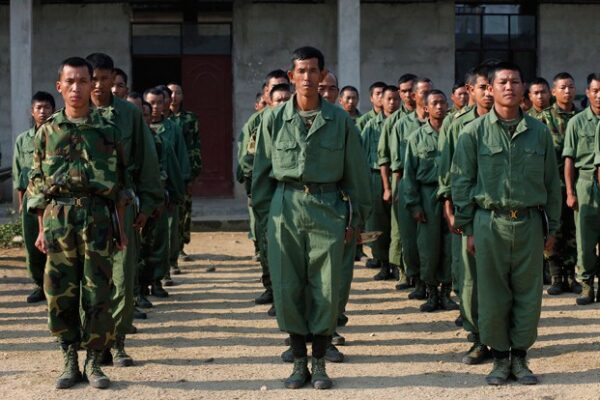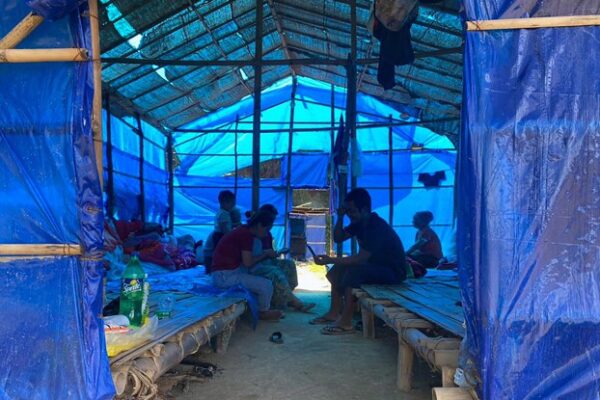
Myanmar junta seeks to wipe out headquarters of Kachin rebel group
The Myanmar junta is going all out with its air and ground forces to wipe out the headquarters of ethnic Kachin rebels in northern Kachin state, eliminating a lifeline of support for anti-regime militias in neighboring Sagaing region, political and military analysts said. A fierce battle broke out between military troops and Kachin Independence Army forces on Monday near the Lai Lum Awng Jar base camp in Kachin’s Momauk township, said Col. Naw Bu, the group’s information officer. Between 50 and 100 junta soldiers have been trapped by KIA forces inside the camp for more than two months, he said. The junta launched three air strikes while some of its troops who tried to rescue them were intercepted by the KIA along the route. Fierce fighting between junta troops and joint KIA and local People’s Defense Forces – ordinary citizens who have taken up arms against the junta – in the upper townships of adjacent Sagaing region earlier this year began moving in July towards the KIA’s headquarters in Laiza, a remote mountainous town in Kachin state that lies on the border with China, area residents and KIA members said. Since then, the junta’s 1,000-strong force has been attacking Nam Sam Yang village in Waingmaw township near Laiza, while the KIA and some soldiers from the Arakan Army, another ethnic armed group, have jointly defended it, they said. There also has been three months of intense and continuous fighting along the Myitkyina-Bhamo road as the junta tried to gain control of the major cities of Hpakant, Bhamo and Myitkyina in Kachin state, Naw Bu said. “The junta even launched air strikes,” he said. “That’s how intense the military situation is.” “They have reinforced their troops to try to control Hpakant, Myitkyina and Bhamo cities,” he added. “That’s why their troops have reduced strength in Sagaing region, and fighting there has decreased as well.” Hotbed of resistance Up to now, areas of northern Sagaing bordering Kachin have been a hotbed of armed resistance since the military seized power from the democratically elected government in a February 2021 coup. Nine military junta warships loaded with weapons and food supplies, which sailed up from Mandalay along the Ayeyarwady River, arrived in Bhamo on Aug. 19 to reinforce the military base along the Myitkyina-Bhamo road near Laiza, according to local and KIA sources who declined to be named for safety reasons. When the junta columns could not move forward after intercepting KIA forces burned their vehicles and destroyed their supplies, the junta launched air strikes, they said. More than 1,000 residents displaced by the fighting have taken refuge in monasteries and Christian churches in Momauk and Bhamo, said a Bhamo local. Kachin Independence Army recruits undergo training at a military camp near Laiza in northern Myanmar’s Kachin state, Feb. 13, 2012. Credit: Vincent Yu/AP Over 80 battles have occurred in the vicinity of Bhamo, Hpakant, Tanai, Shwegu, Momauk, Waingmaw and at the KIA’s Laiza headquarters between July 23 to Sept. 11, during which junta forces conducted more than 20 air strikes, Naw Bu said. During these battles, 51 junta soldiers were killed and 106 were injured, he said, though he did not disclose the number of KIA casualties. Win Ye Tun, the junta’s social affairs minister and Kachin state spokesman, said he did not know details about the fighting. Junta spokesman Maj. Gen. Zaw Min Tun could not be reached for comment. ‘Cut it from the roots’ Thein Tun Oo, executive director of the pro-military Thayninga Institute for Strategic Studies, said the military is targeting KIA headquarters in Laiza because it wants to eliminate the supply source for armed opposition in the region. “As long as you cannot control the sources of supply for your enemies, you won’t be able to control what is happening on the front,” he said. “This means that if you only cut the branches without cutting the root sources, it will not be enough to kill a tree. To cut down a tree, you need to cut it from the roots.” “Because Laiza is a major source of supplies for the resistance groups, the military’s major aim is to wipe it out so that at least its supply lines of personnel and weapons can be eradicated,” he said. The military junta is trying to wipe out Laiza, so it can control the upper part of Sagaing region, said a political and military analyst on condition of anonymity so he could speak freely. “Since the junta has suffered the loss of many territories especially in Sagaing region, it is attacking Laiza in Kachin state to strategically control and cut the source of supplies for the revolutionary forces becoming stronger in Sagaing region.” Junta troops have been attacking the Laiza headquarters with a much larger force than before, while the KIA is strongly resisting them to prevent the regime from achieving its goal, he added. With junta soldiers stepping up fighting in Kachin state, the number of attacks in the upper Sagaing region, such as Indaw, Tigyaing, Katha and Banmauk townships, has decreased, local defense forces said. The junta’s Light Infantry Battalions 416, 309, 301 and 416 used to be stationed in Indaw township and would raid villages, but now only the 77th battalion is there, said the information officer of Indaw Revolution, a defense team in Sagaing region, as troops appear to be headed to Hpakant for reinforcement. More than 80 battles have been fought in Indaw township, and more than 20 civilians have been killed by junta soldiers since the 2021 coup, said the information officer, who declined to identify himself by name for safety reasons. Similarly, KIA-PDF joint forces have fought more than 100 battles with junta troops in Katha township, resulting in the deaths of over 80 civilians and the burning of more than 900 houses, according to an official of the Katha township People’s Defense Force. RFA could not independently confirm the death toll figures. More than 24,000 civilians have fled to safety due to…








